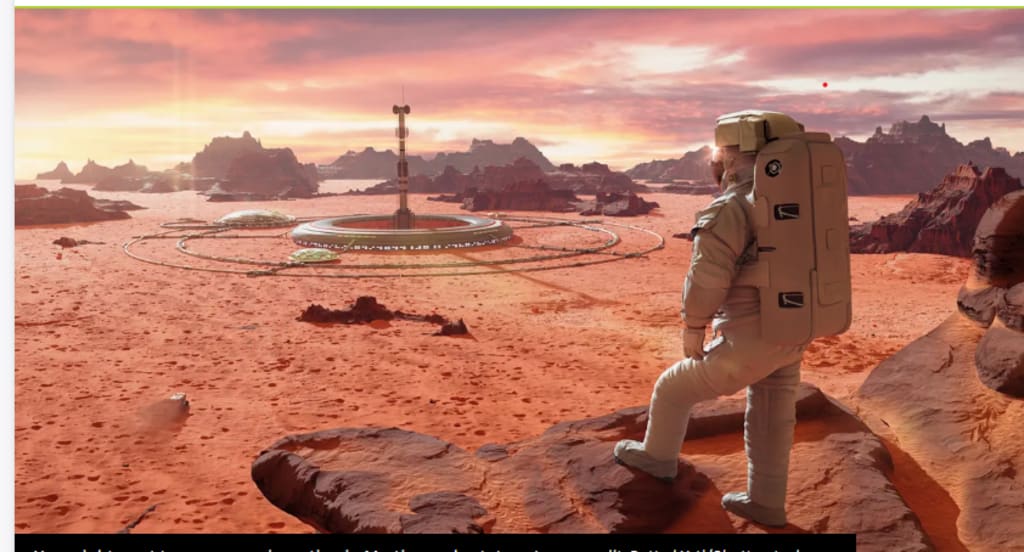When Can We Make Space Our Own?
The answer hinges on how seriously we take the risks, and how much research and work we put into it.

According to one of the pioneers of rocket science, Konstantin Tsiolkovsky, "Earth is the cradle of humanity, but one cannot live in a cradle forever." Humanity has been venturing into space with tentative steps since the late 1950s. Humans have been living in orbit for the entirety of this century, and we anticipate that this will continue. Can humans, however, settle in space?
The question is complicated: Is this big leap really going to happen soon? Is it feasible? Will the people who go there and the ones who stay here be safe? Fortunately, two incredibly talented science communicators, Dr. Kelly and Zach Weinersmith, took on this task and turned it into an incredibly captivating book called A City on Mars, which explores the opportunities and problems that humanity may face in its possible expansion into space.
The dearth of thorough research on all topics pertaining to the human experience in these future settlements is evident right away. There are many who claim that space travel is inevitable, but there is still a lot we don't know.
"What I would invest in right away are ecosystems known as closed-loop systems. In an exclusive interview with IFLScience, Zach Weinersmith described these systems as essentially sealed containers within which an ecosystem is created. Like a miniature Earth. We haven't done it very often. We have only worked with a maximum of eight [people] thus far, and we have no idea how it scales.
Further research is required because it's possible that maintaining human life in these systems will be more difficult to manage for a large population, but it might also be easier. Medical facilities were not included in the largest test, which seems to be a common practice in space research.
The first major revelation I had was the dearth of knowledge about space medicine that is applicable to a space settlement's way of life. Since hundreds of astronauts have visited space aboard Earth-orbiting stations, I figured we had learned the majority of what we needed to know from them and the experiments they conducted there.
However, these space stations and their occupants are shielded from space radiation by Earth's magnetosphere, something that wouldn't exist on Mars. Thus, our understanding of the radiation risks is lacking. Furthermore, although life in Earth's freefall orbit is known to be detrimental to bones and muscles, it is unknown whether or not living in Mars' 40% gravity will totally mitigate these issues. Naturally, Mars also faces other issues, such as poisonous regolith that is carried into space by global dust storms.
There are difficulties not only on Mars but also on the much closer Moon. The absence of carbon, a vital component, will present challenges for any settlements there. As a result of the Apollo astronauts leaving their bags of poop, urine, and vomit on the Moon, there are currently six caches of high-density carbon there. However, carbon is required if agriculture is to support a settlement.
"More carbon cannot be produced on the spot. This is a problem because it's made of stars, Zach clarified. "People frequently discuss how much water there is on the moon. Additionally, there isn't much water. Since it's a limited resource, the first person to claim it is most likely to keep it.
The book also discusses how uncertain the current legal framework is for regulating space exploration and how, in the absence of updates, it would govern space settlements. It leaves much to be desired in terms of preventing the risk of war and human rights from making the next step forward into a step backward.
The argument made by proponents of space settlement that we might need to reevaluate what constitutes valuable human life was very unsettling to read. They contend that because early Mars settlements will necessitate enormous time and energy commitments, these communities won't have the capacity to assist individuals with disabilities, according to Kelly.
We should be able to move forward with a plan for how we can value and support each and every settler if we take our time and carefully clear space. The necessity for humanity to have a "Plan B" in case something disastrous occurs on Earth is one of the primary drivers behind the relocation to Mars. It would be terrible to see humanity's future fall far short of the strides we have made in the area of human rights.
There is no denying the difficulties. More than many advocates would prefer, to be sure, but wishing them away won't make up for the necessity of sound frameworks and research for space settlements in the future. Ultimately, to paraphrase JFK, we undertake these endeavors "not due to their ease, but rather because they are hard
There is a way forward, and the majority of what we must do to get there is already something we should be doing. Aside from that, it's just really cool stuff, Zach exclaimed. "Imagine telling someone you work in a field like closed-loop ecology or space obstetrics—there is so much science to be done, it's incredible!"
"We need to create a planet where war and terrorism are less likely to occur in international law." Additionally, having it would generally be beneficial.






Comments
There are no comments for this story
Be the first to respond and start the conversation.